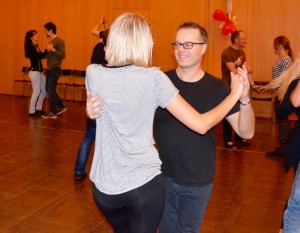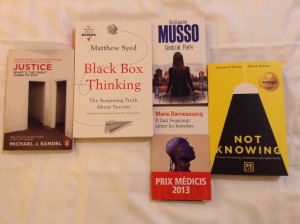Wherever you are, I hope you’ve had a wonderful start to the New Year, and that you’re raring to go for a great year ahead full of growth and learning! Here are some tips to get you started:
1. Focus On Your Learning System, Not Your Goals
Goals on their own are just wishes, really.
Having a system means you have organised a certain number of hours each week for English, with a general plan on what you’re going to focus on.
Once you have organised a good weekly programme, you’ll reach your goals anyhow, assuming you stick to the system. So if you’ve organised 5 hours of classes every week this semester, and on top of this have a few hours for homework and fun activities in English, you’re going to get better and hit your target!
On the other hand, if you say to yourself “I’m going to reach B2 level this year and take the Cambridge First Exam” then it’ll be much much harder if all you have is the goal without the accompanying system.
2. Active Beats Passive
Producing something in English will be more effective than being passive.
Examples of active learning include:
- Reading a text in English and responding to it: summarising what it’s about or answering questions to discover more about what the writer is trying to communicate.
- Listening to the news or watching your favourite TV show and giving yourself a learning task: summarising the day’s top headlines or writing a review of the show.
- Speaking and interacting with your teacher or a partner during class. Let’s say you’re talking about your plans for the New Year: your task could be to present your plans and then to find out if your teacher or friend has made any New Year’s resolutions of their own.
Examples of passive activities which could demotivate you include:
- Listening to the BBC news and then switching off after a few minutes. Or 20 seconds.
- More or less following a discussion in class, but not really taking part (and then looking out the window fantasizing about your date later tonight).
- Downloading 15 apps for learning English but then not using any of them.
- Reading an article about how to write an email but then not actually writing an email.
In short, make sure you’re practising!
For more on listening to the news, check out his worksheet:
3. Busy? Double up and live the language!

At the time of writing I’m still based in Europe, although that’s going to change very soon. I have dance lessons in Czech, and the whole time I’m speaking and interacting and having fun with my teacher.
So instead of just having English lessons, you can do what you are already doing in your everyday life – but in English.
As well, I have conversation classes in Czech with a university student. When I need to write to my accountant, I write it when I’m with her, and then get her feedback before sending it off. Alternatively if I need to go to the post office or a state office, she comes along and the whole thing is much more enjoyable and I’m always picking up new words or improving how to say things.
I totally recommend this for you too – your ‘English hour’ doesn’t have to be a traditional lesson. You can also do things in English during this time that you need to get done.
One more example of what I mean:
Let’s say your New Year’s resolution is to get fit – why not hire a trainer who speaks English..? You’ll be getting fit and losing weight while also interacting in English. If money’s a problem, you can find someone who shares the same goals and head to the gym together and make new friends.
4. Work On Fluency First Before Worrying About Things Such As Grammar
If you’ve been out of the game (= away from English) for a while, a good place to start is to do a lot of speaking and interacting first. Building up your fluency is a great way to feel more confident and self-assured, and then you can take things from there.
Working on your fluency is a bit like preparing a meal. As you start cooking (speaking) you realise that maybe there are some other ingredients missing, and so you can add them in as you go (instead of salt and pepper, the ingredients could be grammar, vocabulary, or pronunciation – well, unless you really want salt with your gerunds!).
However, how will you your meal taste if you throw in the separate ingredients first..? Probably not as good. Start with the interaction and fluency.
5. It’s A Bit Like Learning How To Dance

When I first started zouk, my teachers could have sat us all down in an office or classroom and explained the history and theory of the dance with all kinds of charts, tables and graphs.
However, instead of giving a lecture for 90 minutes about how to dance, they *showed* us. We were interacting and connecting from the very first lesson.
On top of this, one thing my dance teachers do very well, especially in my individual classes, is to see where I am *right now*, and then to take it from there. It’s similar to the metaphor of preparing a meal. Once you are dancing, your teacher can see what your level is like and then show you and give you feedback on how to get to the next level.
Compare this approach to a typical group class at a language school. In your first lesson you might start from page 1 in your book. But what if you’re at page 35 or don’t need to start from the very first page?
You’ll make more progress if your teacher sees where *you* are and then uses that as your starting point.
6. Observing And Noticing Are Still Important
When you’re speaking with your teacher, see if you can notice extra things about the language. There are many questions you can ask yourself. Maybe focus on one or two areas each lesson and see what you can observe:
- When your teacher is speaking about their weekend, do they use any cool phrases..?
- Which phrasal verbs do they use?
- How does the intonation or ‘song’ of English sound to you? How different is the melody of English compared to your language?
- How much more formal or informal does the language sound..?
- How does your teacher link words together in a sentence..?
- Do you notice any grammar patterns that they use and which you’ve learnt recently?
- What discourse markers or ‘linking words and phrases’ do they use to present their ideas (on the other hand, right, ok, so then, I mean, y’know, well anyhow, for a start)?
Of course, noticing and observing can take place during reading and listening activities. Maybe once you’ve done a typical reading exercise in class, take the time to go back and see if you notice language that will be useful for you. Maybe the article you’ve just read has a whole bunch of phrases and expressions waiting for you to discover and steal.
“But I don’t know how to notice language!” you might say. It may take some time. You can ask your teacher for tips on how to notice useful language, but if for some reason they don’t cover “learning how to learn,” you can still practise this each time, and you’ll definitely see some progress. Think of yourself as a ‘language detective’: what can you find that you’d like to use in your interactions?
Go in with a curious mind and you’ll be surprised by how much you pick up!
7. Keep It Fun And Enjoyable
You can’t always be in study mode. Watch your fave TV show for fun. Sit back, relax and just enjoy it. And give yourself a pat on the back for what you understand, not what you might miss.
That goes too for reading – grab a book for your level and read it during a rainy afternoon.
Here’s my reading list to start the year:

8. Meet People & Make Real Connections
One of the best things about learning a language is the opportunity it gives us to meet new people and make new friendships. In some cases it can even lead to love and marriage.
However some people see meeting English speakers as a chance to “practice their English.” Native English speakers, especially English teachers, have a radar and we can feel when someone is not genuinely interested in getting to know us.
So when you’re at a party next, see if you can find things in common with people. Find out why they’re doing what they’re doing. Go beyond small talk, have some fun and get to know them.
9. Learning Isn’t A Cost, It’s An Investment In Yourself

Do you see learning English as an investment in yourself? Some people are worried about spending money on education, perhaps because they don’t ‘see’ the results of their learning straight away or because they feel it should be free. In any case, see learning English as a way to build a bridge from who you are today to who you want to be tomorrow. It’s going to be a big part of your education, and it has the potential to open your eyes to new experiences, new relationships and as a way to grow as a person.
Go in with a positive mindset – focus on the journey of learning, not the goal to reach a particular destination!


[…] If you’re more of a grammar person, as you go about noticing language patterns see if you can work out what a particular rule is on your own before checking with a teacher or other resource. This will help you get a lot better with understanding English (nb I mentioned noticing last week here). […]